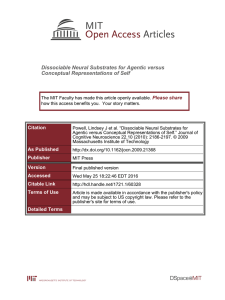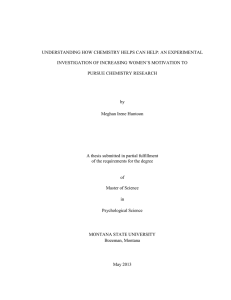Why do we obey?
advertisement
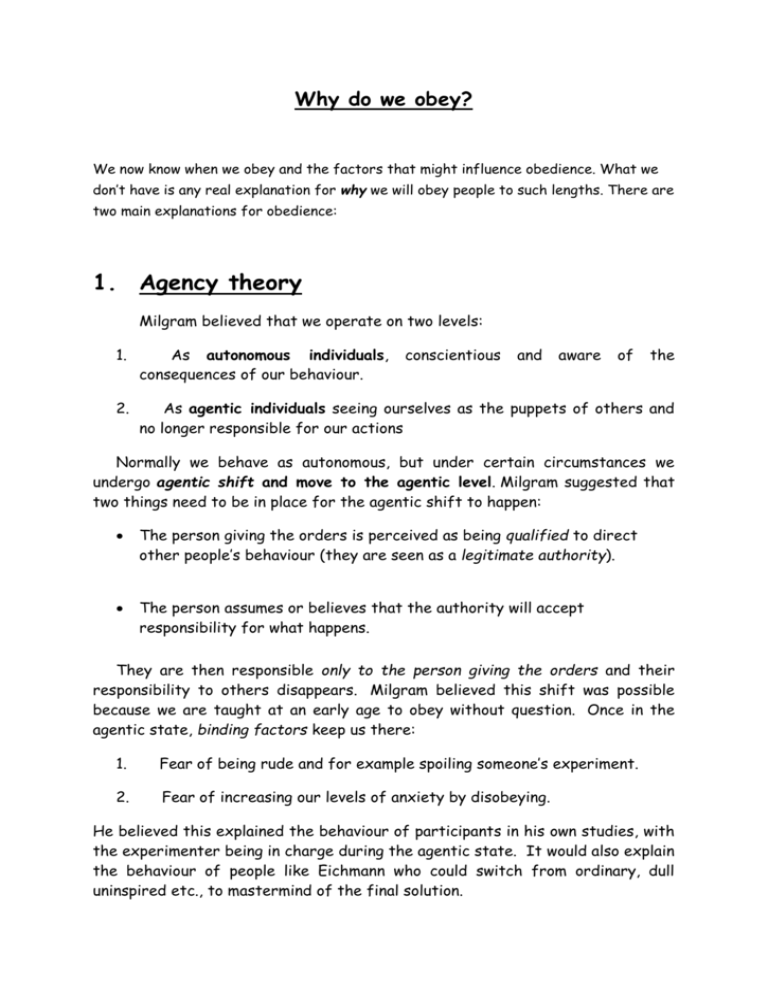
Why do we obey? We now know when we obey and the factors that might influence obedience. What we don’t have is any real explanation for why we will obey people to such lengths. There are two main explanations for obedience: 1. Agency theory Milgram believed that we operate on two levels: 1. As autonomous individuals, consequences of our behaviour. conscientious and aware of the 2. As agentic individuals seeing ourselves as the puppets of others and no longer responsible for our actions Normally we behave as autonomous, but under certain circumstances we undergo agentic shift and move to the agentic level. Milgram suggested that two things need to be in place for the agentic shift to happen: The person giving the orders is perceived as being qualified to direct other people’s behaviour (they are seen as a legitimate authority). The person assumes or believes that the authority will accept responsibility for what happens. They are then responsible only to the person giving the orders and their responsibility to others disappears. Milgram believed this shift was possible because we are taught at an early age to obey without question. Once in the agentic state, binding factors keep us there: 1. Fear of being rude and for example spoiling someone’s experiment. 2. Fear of increasing our levels of anxiety by disobeying. He believed this explained the behaviour of participants in his own studies, with the experimenter being in charge during the agentic state. It would also explain the behaviour of people like Eichmann who could switch from ordinary, dull uninspired etc., to mastermind of the final solution. Question - In which of the obedience studies (or variations) that we have covered so far might an agentic shift have happened (or not happened)? Evaluation of agency theory Positive Conversely, when participants were reminded that they were in control of their own actions, the level of obedience dropped dramatically. Milgram documented occurrences of participants asking who would take responsibility for the learner. Some participants who were refusing to go on did so if the experimenter said that he would take responsibility. Evidence of agency comes from real life events such as Vietnam soliders stating "I was told to do it". Negative Milgram’s own participants showed clear evidence of moral strain as they displayed signs of anxiety. The theory does not explain independent behaviour as 35% did not give 450V. The theory is derived from lab studies which lack realism. The concept of agency is difficult to isolate and hard to test. The concept is based on a circular argument - we are in an agentic state because we obey; we obey because we are in an agentic state. 2. Legitimate or Perceived authority Society gives power or authority to certain people that they are able to exercise over others. Obvious examples include the police. Many examples are situation specific, for examples teachers (supposedly!) have authority in schools, traffic wardens in parking areas, doctors over their patients etc. This could be by role, by reward, by punishment, by knowledge, by personality. Clearly these 2 explanations are not separate, they overlap a great deal (in fact perceived legitimacy is a factor in agency theory). Respect for authority, like this, clearly has its advantages in allowing for the smooth running of a society, and its rules are hammered home in all of us from a very early age. The danger comes when we blindly obey such figures and as a result behave in an immoral way as a result. This might perhaps help to explain some of the differences found in levels of obedience between different countries. Some countries such as Australia have a history of questioning authority whereas countries like Germany teach their children from an early age to respect authority. 3. Personality The Authoritarian Personality is a personality type that has been proposed to be common, in which we are predisposed to follow the dictates of a strong leader and traditional, conventional values. The authoritarian personality is characterised by: excessive conformity submissiveness to authority intolerance insecurity superstition ridged, stereotyped thought patterns
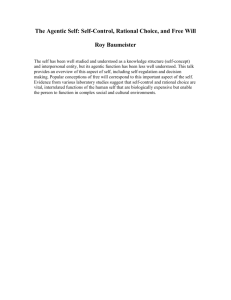
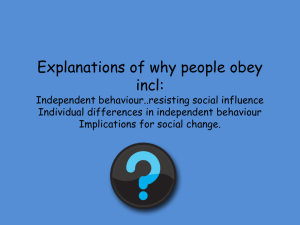

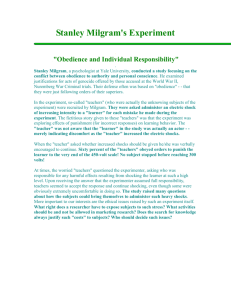
![milgram[1].](http://s2.studylib.net/store/data/005452941_1-ff2d7fd220b66c9ac44050e2aa493bc7-300x300.png)



